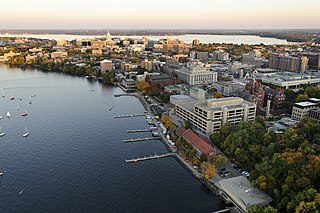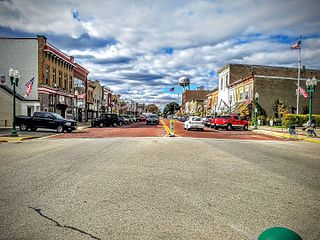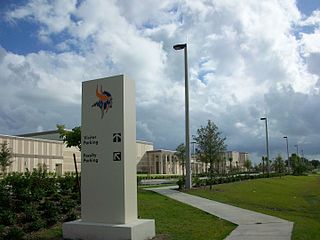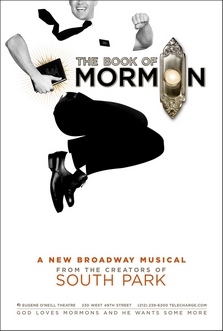
Paul Leonard Newman was an American actor, film director, race car driver, philanthropist, and entrepreneur. He was the recipient of numerous awards, including an Academy Award, a BAFTA Award, three Golden Globe Awards, a Screen Actors Guild Award, a Primetime Emmy Award, a Silver Bear, a Cannes Film Festival Award, and the Jean Hersholt Humanitarian Award.

Madison is the capital city of the U.S. state of Wisconsin and the seat of Dane County. The population was 269,840 as of the 2020 census, making it the second-most populous city in Wisconsin, after Milwaukee, and the 77th-most populous in the United States. The Madison metropolitan area had a population of 680,796. The city is located on an isthmus and lands surrounding five lakes—Lake Mendota, Lake Monona, Lake Wingra, Lake Kegonsa and Lake Waubesa. Madison was founded in 1836 and is named after American Founding Father and President James Madison.

Gary Rich Burghoff is an American actor who is known for originating the role of Charlie Brown in the 1967 Off-Broadway musical You're a Good Man, Charlie Brown, and the character Corporal Walter Eugene "Radar" O'Reilly in the film M*A*S*H, as well as the TV series. He was a regular on television game show Match Game from 1974 to 1979 for 204 episodes, standing in for Charles Nelson Reilly, who was in New York doing a Broadway play, and continued to make recurring appearances afterwards.

Walworth County is a county located in the U.S. state of Wisconsin. As of the 2020 census, the population was 106,478. Its county seat is Elkhorn. The county was created in 1836 from Wisconsin Territory and organized in 1839. It is named for Reuben H. Walworth. Walworth County comprises the Whitewater-Elkhorn, WI Micropolitan Statistical Area and is included in the Milwaukee-Racine-Waukesha, WI Combined Statistical Area. Lake Geneva, the University of Wisconsin-Whitewater, and Alpine Valley Resort, and Music Theatre are located in Walworth County.

Lake Geneva is a city in the U.S. state of Wisconsin. Located in Walworth County and situated on Geneva Lake, it was home to 8,277 people as of the 2020 census, up from 7,651 at the 2010 census. It is located 40 miles (64 km) southwest of Milwaukee and 65 miles (105 km) northwest of Chicago.

Williams Bay is a village in Walworth County, Wisconsin, United States. It is one of three municipalities on Geneva Lake. The population was 2,953 at the 2020 census.

Delavan is a city in Walworth County, Wisconsin, United States. The population was 8,505 at the 2020 census. It is located 45 miles (72 km) southwest of Milwaukee. The city is located partially within the Town of Delavan, but the two entities are politically independent. Delavan is home to Delavan Lake which brings in a large number of tourists each year, and is also close to Lake Geneva, another popular tourist destination.
Walworth is a town in Walworth County, Wisconsin, United States. The population was 1,565 at the 2020 census. The Village of Walworth is located within the town. The unincorporated communities of Big Foot Prairie and Delavan Lake are also located partially in the town.

Mormon cinema usually refers to films with themes relevant to members of the Church of Jesus Christ of Latter-day Saints. The term has also been used to refer to films that do not necessarily reflect Mormon themes but have been made by Mormon filmmakers. Films within the realm of Mormon cinema may be distinguished from institutional films produced by the LDS Church, such as Legacy and Testaments, which are made for instructional or proselyting purposes and are non-commercial. Mormon cinema is produced mainly for the purposes of entertainment and potential financial success.
Dobama Theatre is located in Cleveland Heights, Ohio, United States. It was founded in 1959 by Donald and Marilyn Bianchi, Barry Silverman, and Mark Silverberg. The name Dobama was created from the first two letters of each man's name. The first play produced by Dobama Theatre was The Rope Dancers by Morton Wishengrod.

Area code 262 is a telephone area code in the North American Numbering Plan for the southeastern part of the U.S. state of Wisconsin. The numbering plan area comprises suburbs that are a part of the Milwaukee and Chicago metropolitan areas. The area code was created on September 25, 1999, in an area code split of area code 414.
Paul Eiding is an American actor, best known for his voice roles as Colonel Roy Campbell in the Metal Gear series and Max Tennyson in the Ben 10 franchise.

West Orange High School is a high school located in Winter Garden in southwest Orange County, Florida, United States. West Orange serves Winter Garden, Oakland, Tildenville, and parts of Lake Butler and Ocoee.

Dearborn High School (DHS) is a public high school located in Dearborn, Michigan. It was founded in 1893 in Dearborn near Metro Detroit. Dearborn High is one of the three high schools of the Dearborn City School District and is located at 19501 Outer Drive. There are over 2,000 students currently attending Dearborn High.
Wisconsin's 1st congressional district is a congressional district of the United States House of Representatives in southeastern Wisconsin, covering Kenosha County, Racine County, and most of Walworth County, as well as portions of Rock County and Milwaukee County. The district's current Representative is Republican Bryan Steil.
James Francis Fitzgerald was an American businessman and former professional sports owner, best known as a former owner of the Milwaukee Bucks and the Golden State Warriors, both NBA teams.

Will Swenson is an American actor and singer best known for his work in musical theatre. He also has developed a film career, primarily in LDS cinema.
Williams Bay High School is a 4-year public high school located in Williams Bay, Wisconsin. The school enrollment is approximately 181 students. The school district serves the village of Williams Bay, and the towns of Delavan, Linn, Walworth, and Geneva.

A Victim of the Mormons is a 1911 Danish silent drama film directed by August Blom. The film was controversial for demonizing the Mormon religion, and its box-office success is cited for initiating a decade of anti-Mormon propaganda films in America. It tells the story of an attractive young woman who is seduced and kidnapped by a Mormon missionary, then forced to accompany him to Utah to become one of his wives. The film became a hit, partly due to the popularity of its star, Valdemar Psilander, and partly due to the publicity arising from objections by the Church of Jesus Christ of Latter-day Saints and its failed campaign to ban the film.

The Book of Mormon is a musical comedy with music, lyrics, and book by Trey Parker, Robert Lopez, and Matt Stone. The story follows two missionaries of the Church of Jesus Christ of Latter-day Saints as they attempt to preach the faith to the inhabitants of a remote Ugandan village. The earnest young men are challenged by the lack of interest from the locals, who are distracted by more pressing issues such as HIV/AIDS, famine, female genital mutilation, child molestation, and oppression by the local warlord.















